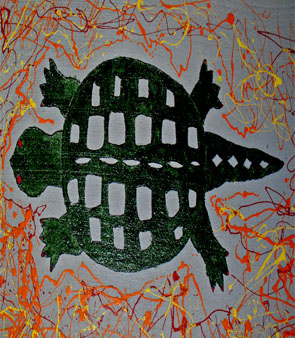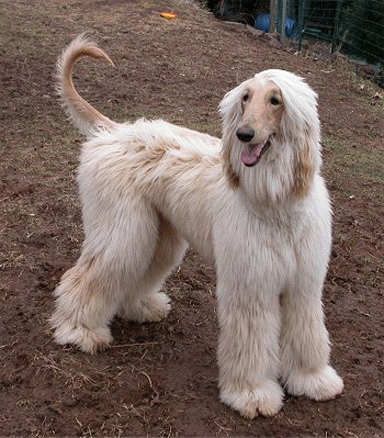This piece was reprinted by OpEd News with permission or license. It may not be reproduced in any form without permission or license from the source.
Afghan Hounds are to Afghanistan what McDonald’s are to America. No, let me rephrase that; McDonald’s are corporate watering holes for the clogged-artery crowd, and Afghan dogs...don’t exist in Afghanistan, anymore; at least not to any extent that I could discern, after crossing that cursed country of the damned and divine, and dining on the doorstep with the dark dog of death.
Maybe I can explain. In the states, Afghan hounds are an ancient but not very populous breed. Modern purebred breeds of Afghans descend from dogs brought to Great Britain in the 1920’s. Once out of Persia, Afghanistan, and India, the Ghazni strain from Kabul was imported to the United States in 1934. The long hair and spectacular beauty makes them desirable show dogs and pets. They are known as “high society” dogs, with a slow “obedience intelligence” and a leaning toward independence, who sometimes choose to ignore commands.
In my travels in Afghanistan, I saw many dogs, but no pedigree Afghan hounds. Lots of village dogs exhibited Afghan traits: the swooping tail, the narrow face, like the one slinking in the photo below, but they were scrawny and not pampered—mutts, if you wish. The only full breed I could recognize was in a cage at the Kabul Zoo, next to Afghanistan’s only lion. Both the dog and lion were old-looking--the dog was lying down and looked bored and tired. It seemed improbable--a domestic dog behind vertical bars, like jail. The lion was mangy-looking, with ribs showing, and a tattered mane. One could approach the bars and have one’s arms torn off, if one wished. I can assume that I was gazing upon Afghanistan’s only Afghan Hound. Maybe they are too valuable, and the puppies bartered off like poppies, on the caravan trail. Maybe the West has harvested the genes necessary for profitable propagation. Later, however, when the Russians invaded and bombed everything to smithereens, I read in a newspaper of the possibility of the lion starving to death, and a plea for donations. But no mention of the dog.
Not to say that other dog-worthy symbols of Afghanistan did not exist. Dining at a cafe in Kandahar, or at least on the wood steps outside, I reflected on the obscure Afghan bus depot that had routed me here from the middle of the desert. There, I had waited with a scraggle-bearded Frenchman in a claptrap ten-by-ten lobby. He, like a coterie of Europeans and Americans traversing Afghanistan’s hippie highway, on the road to maybe Goa or Katmandu, wore an authentic Afghan coat, and I could see that Afghan dogs were not forgotten, but did live on, in a haberdashery sense: Afghan coats reflect the distinctive proportions of Afghan hounds: leather with flared wool cuffs and lapels, like pampered pompadours, as if I were witnessing, some red scarf version of a Victorian-attired, Afghan dog Frenchman.
The coat seemed to emanate an independent streak. When the Frenchman found out that the arriving bus was four hours late, he would have none of it. “What!” he screeched at the poor Afghan agent, and tapped his watch. “Four hours! That is crazy!”
The agent, a slim young man, used to the Hindu Kush time zone, could not suppress a smile at the Frenchman’s consternation, which only infuriated the Parisian more. He shook with fury, and pulled his thin mustache. “You are sheet!” His voice reverberated in a high pitch. He waved his wooly cuffs. “You hear me?” The Frenchman’s fury only served to delight the Afghan; his face shined; his teeth gleamed; he was ecstatic. “Sheet! You are sheet!” The Parisian swelled; his veins bulged; he swore. “You hear? SHEET!”
Outside, I am sure, a few Afghan strays raised their scrawny necks at the ruckus. But the frantic Frenchman, wildly waving his woolen cuffs, only made himself look less like the endangered Afghan hound that he emulated, and more like a pampered French poodle.
Oh, I had searched for the legendary Afghan, and explored the fabled streets of Kandahar, as well as Kabul and Herat. But mostly, I saw Mastiffs, impossibly huge animals, with shoulders as broad as tractors, and jaws like bionic pit bulls. Often, in the alleys, I had to back away, confronted by the beasts, who lived on rooftops of walled homes and estates. Built for fighting, they fulfill an old Afghan tradition. Dogs in Afghanistan have to be sturdy to survive. I counted eight on this roof, and a horse down below.
Where are the Afghans?—I wondered. Such beautiful animals. Beauty, apparently, is ephemeral. I remember in Seattle, a couple of years back, driving downtown, I saw an attractive young woman at a crosswalk, with a beautiful Afghan on a leash. Then, I noticed the dog’s right foreleg was shattered, apparently hit by a car, its silken skin stripped away, leaving just bone and bits of red flesh, yet still standing with classic style. The woman, with perfect blond hair and city dress, wore a look of helpless shock, and stood in enigma with her maimed pet. In the traffic, I could not stop.
Wish that I had—I thought—sitting on those Kandahar steps, and savoring the plate of rice and beef. Some things, like a warm meal, one takes for granted, until you find yourself in the starkness of an Afghan street.
Suddenly, I sensed something. Turning, I locked eyes with a huge black dog, a veritable beast, dragging its entrails down the street. A football-size wad of black and glistening guts hung from its belly, like some obscene alien, and trailed behind on the dirt road. I remember a distinct sound—the slow slide of intestines on packed soil, as he looked away, and stepped gingerly and methodically toward his death. No one in the street paid any attention, not even a casual glance. It was as if death had the right of way. I do not fault the Afghan people for this; they have been brutalized by countless civilizations, including our own. Yet out of poverty, a purity emanates. Compared to us, they survive on nothing, and are the most noble and brave people I have ever encountered. They possess a simple and complex richness, that defies the calculations of our empty corporate Alexanders. Nevertheless, I put down my disemboweled dinner. The beef had lost its flavor.
Like a ghost, the dog vanished, as if a cloud had passed, but the look lingered. Dark, black, and expecting nothing. Afghanistan.
(Note: You can view every article as one long page if you sign up as an Advocate Member, or higher).






